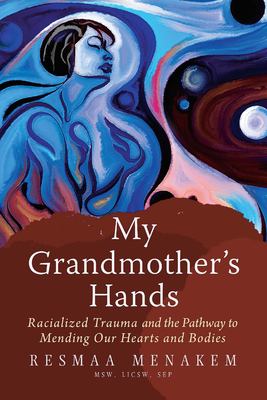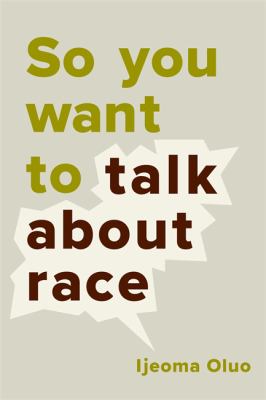Oluo & Menakem, Mindful and Embodied Anti-racism
Both Ijeoma Oluo (3/24, 7:00pm) and Resmaa Menakem (3/25, 6:00pm) will be giving presentations at BC (via Zoom) this week. (Click links for details and free reservations.)

I rarely read one book at a time. In the last few months I’ve been slowly working my way through Resmaa Menakem’s My Grandmother’s Hands. Menakem cautions readers to proceed slowly—it’s more of a workbook than a book—so I feel like my pace is justified. But I did stop entirely for a while. I had watched an online celebration of Octavia Butler with N.K. Jemisin, Imani Perry, and Walter Moseley, who told me (and a few thousand other people) in no uncertain terms that I had to read Butler’s Kindred, so I paused Menakem for a week, and now the two books are inextricably linked in my mind.
The title of Menakem’s book comes from a short anecdote: as a child, he asked his grandmother why her hands were so much more tough and calloused than his. She told him she had begun picking cotton at the age of four, and the plants had torn and bloodied her soft hands until they’d toughened up from the work. He would rub them, and she would hum like a cat purring. The book is about bodies, specifically how privilege and white supremacy are embodied, and how we need to turn our attention from the idea of racism to its manifestations in the body in order to heal. The book is full of exercises for healing, including humming. That he draws heavily on the coping strategies of his Black elders is an appealing (and crucial) feature.
As I read Kindred, I was struck by how the book played out on bodies. Dana, the protagonist, travels in time, but saying it that way doesn’t get across the violence of the travel, which is a wrenching dislocation against her will accompanied by dizziness and nausea. In the slavery-era world to which she travels, she comes to realize that what’s summoning her over and over is a body under threat. (Who that body belongs to will likely surprise you.) As you might imagine, Black bodies are threatened and hurt by white bodies without qualms, and–mirroring Dana’s travel–sent without warning and against their will to other yet more hellish locales.
Much of Menakem’s book centers on the generations of trauma created by racism: “In America, nearly all of us, regardless of our background or skin color, carry trauma in our bodies around the myth of race” (14). We all travel back in time to some extent, with the past catching up to us through our bodies. Dana’s husband in Kindred, a white writer on the cusp of success, falls into the past with her, and gets stuck there for several years. When he returns, his hair has greyed and he has a massive scar on his face inflicted by a crowd attempting to kill him for his abolition work.

Enough of my friends had recommended Ijeoma Oluo’s So You Want to Talk About Race that after Kindred I could no longer put off reading it. Now I’m moving back and forth between it and My Grandmother’s Hands. And yes, I do want to talk about race, and I want to do it “right,” which early in the book she warns us that we won’t be able to do. We will inevitably stumble. But she hopes the book will at least reduce the more common mistakes.
Menakem’s and Oluo’s book share an impatience with old approaches to anti-racism, and call for changes in approach. Menakem’s solution is to turn from the mind to the body. Oluo focuses less on the individual’s experience than on the institutions that inflict damage: “Getting my neighbor to love people of color might make it easier to hang around him, but it won’t do anything to combat police brutality, racial income inequality, food deserts, or the prison industrial complex” (chapter 2).
She takes on a lot of provocative topics, but her purpose is not to provoke: it’s to demystify. Police brutality, affirmative action, cultural appropriation and the “N” word all become, in her pragmatic prose, matter-of-fact and clearly defined processes. For instance, privilege is simply, “an advantage or a set of advantages that you have that others do not” (chapter 4).
That definition made me reflect on Kindred as a kind of time-travel privilege check. Whenever Dana is transported to the plantation, she’s stripped of privileges by the brutal dictates of chattel slavery. Obviously, there’s more to the novel, but many of the novel’s conflicts revolve around advantages that some have and others lack. But these aren’t abstract concepts: the novel dramatizes white body supremacy all too viscerally, literally bringing the past’s body trauma to the present.
Both Oluo’s and Menakem’s books are worth more than just a read, because they’re both about taking action: Menakem’s book undertakes healing practices for your body to prepare you for taking part in difficult conversations, and Oluo’s mentally prepares you for those conversations. Both books, in other words, reward you in ways that many books don’t: they actually make room for change and action. But change is hard work and will take some time, so plan on some interruptions with other books related in theme. If you haven’t yet read Octavia Butler’s novels, many of which explore the moral dimensions of power, sexuality, and race, Kindred is a gripping introduction.
Works mentioned in this review:
Butler, Octavia. (2003). Kindred. Boston: Beacon Press.
Menakem, Resmaa. (2017). My Grandmother’s Hands: Racialized Trauma and the Pathway to Mending Our Hearts and Bodies. Las Vegas, NV: Central Recovery Press.
Oluo, Ijeoma. (2019). So You Want to Talk About Race (Ebook). New York, NY: Seal Press
For primary sources touching on the history of colonialism, explore the recently added Europe & Africa, Colonialism & Culture area of Gale’s Nineteenth Century Collections Online.
In light of the dramatic increase in anti-Asian hate crimes and recent mass murder in Atlanta, please read the Statement by the Aquino Scholarship Committee and Asian American Studies Program. For quick access to the book titles listed in that statement, visit our virtual book display.